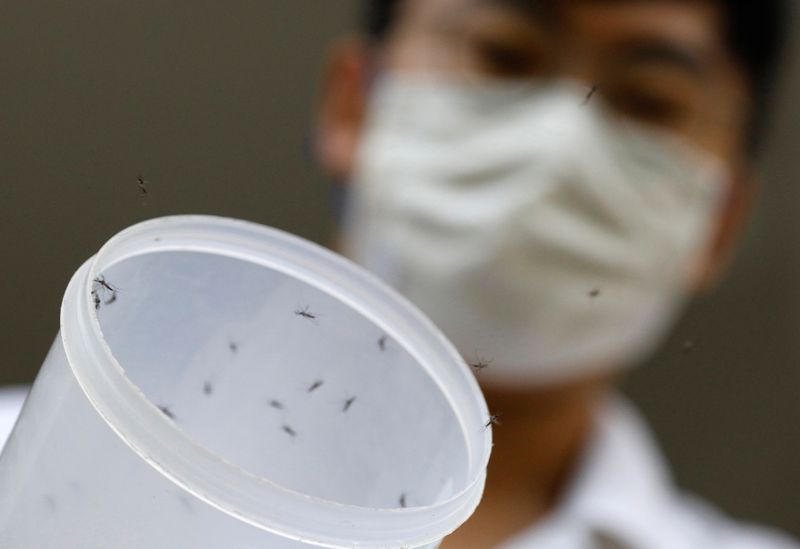By Edgar Su and Joseph Campbell
SINGAPORE (Reuters) - From the high balcony of a Singapore public housing block, an environment official steadies his mosquito launcher, the latest contraption authorities have devised to combat a record outbreak of the tropical disease dengue.
With the click of a button and a whirr of a fan, a hatch opens and 150 lab-reared male mosquitoes are sent flying, off in search of a female companion with whom they can mate but not reproduce.
The dengue virus, which in rare cases can be fatal, is carried and spread to humans by infected mosquitoes.
But Singapore's specially bred mosquitoes carry a bacteria that prevents eggs from hatching, and "compete with the wild type," leading to "a gradual reduction of the mosquito population," said Ng Lee Ching, the official heading the Wolbachia project, named after the bacteria.
Some areas with high mosquito populations have seen up to 90% declines using this technique, she added.
Singapore - a tiny Southeast Asian island nation of 5.7 million people - has recorded more than 26,000 dengue cases this year, surpassing the previous annual record of around 22,000 in 2013 with four months still remaining.
Twenty people have died of the disease this year, which can cause extreme fever that leads to internal bleeding and shock. By comparison, only 27 people have died of the coronavirus in the city-state out of more than 56,000 infections.
A new strain of the disease, combined with unseasonably wet weather and coronavirus lockdowns that left construction sites and other mosquito breeding grounds undisturbed, are all seen as factors behind the dengue outbreak.
That has put the onus on traditional deterrents like fogging, fining people for flouting anti-mosquito regulations like leaving plant pots full of stagnant water, and deploying novel techniques such as the Wolbachia project.
In government laboratories, scientists breed the bacteria-carrying mosquitoes in rows of pallets - separating the male pupae for release in high-risk dengue areas.
For every person living in those areas, up to six Wolbachia mosquitoes are released each week, the environment agency said.
Wolbachia mosquitoes can't transmit diseases such as dengue, and only female mosquitoes bite humans.
When male Wolbachia mosquitoes mate with females that don't carry the bacteria, none of the resultant eggs will hatch.
The strategy has been successful in Australia but some experts say it might have its limits in dense urban areas such as Singapore.
"You've got to flood the island with these mosquitoes, and people get annoyed," said Paul Tambyah, senior consultant at Singapore's National University Hospital.
"They're not going to grab the mosquito and examine and see whether it's a male or female. They're going to swipe them away, and that kind of defeats the purpose," he said.
